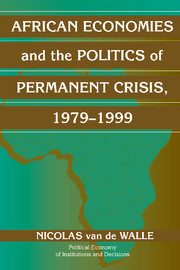Book contents
- Frontmatter
- Contents
- List of Tables
- Acknowledgments
- Introduction
- 1 Approaches to Africa's Permanent Crisis
- 2 Patterns in Reform Implementation, 1979–1999
- 3 Decision Making in Postcolonial Africa
- 4 State Responses to the Permanent Crisis
- 5 The Crisis and Foreign Aid
- 6 Democratization and the Prospects for Change
- 7 Conclusion
- Index
- Title in the Series
1 - Approaches to Africa's Permanent Crisis
Published online by Cambridge University Press: 05 June 2012
- Frontmatter
- Contents
- List of Tables
- Acknowledgments
- Introduction
- 1 Approaches to Africa's Permanent Crisis
- 2 Patterns in Reform Implementation, 1979–1999
- 3 Decision Making in Postcolonial Africa
- 4 State Responses to the Permanent Crisis
- 5 The Crisis and Foreign Aid
- 6 Democratization and the Prospects for Change
- 7 Conclusion
- Index
- Title in the Series
Summary
Since the onset of Africa's economic crisis over twenty years ago, political scientists have sought to explain the inability and or unwillingness of governments in the region to undertake thorough policy reform. This chapter reviews the most valuable insights from this literature, before staking out a modified approach, which will then be considerably expanded in subsequent chapters. Most analyses of why Africa has not been able to renew with economic growth in the last twenty years place the blame squarely on the inability of governments to overcome societal opposition to the policy reform imposed on them by the international financial institutions (IFIs). The policy reform literature usually views societal power as being asserted through organized interest groups, but disagrees on the extent to which state agents can act to achieve real policy change. Much of the academic literature on African political economy also views African governments as prisoners of their societies through their reliance on clientelist practices to ensure political stability.
Both of these literatures contain valuable insights, but they underestimate the autonomy of African governments from societal forces. Most states in the region combine weak capacities and discipline with a fair amount of autonomy to make economic policy decisions, largely because of the weakness of organized pressure groups that would hold the state more accountable. Instead, I argue in this book that the main obstacles to sustained economic reform are to be found within the state itself and the political institutions that link state and society.
- Type
- Chapter
- Information
- Publisher: Cambridge University PressPrint publication year: 2001



